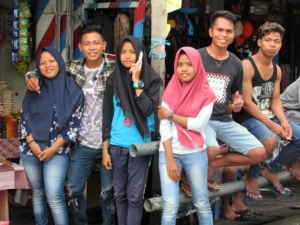Youth Poverty in Indonesia
 The World Bank estimates that about 25% of the Indonesian population lives below the national poverty line, and young people are disproportionately affected. Poverty, specifically among youth, manifests in a variety of ways from their education to their health and future. These circumstances ultimately perpetuate the cycle of poverty for future generations and hamper the country’s progress and development.
The World Bank estimates that about 25% of the Indonesian population lives below the national poverty line, and young people are disproportionately affected. Poverty, specifically among youth, manifests in a variety of ways from their education to their health and future. These circumstances ultimately perpetuate the cycle of poverty for future generations and hamper the country’s progress and development.
Factors Contributing to Youth Poverty in Indonesia
Several factors contribute to the prevalence of youth poverty in Indonesia, including limited access to education, high unemployment and gender inequality.
Access to education remains a significant challenge for youth living in poverty. In particular, many marginalized areas in Indonesia lack adequate resources and infrastructure. With a lack of funding for schools and a shortage of qualified teachers, young people’s education greatly suffers. As a result, children are unable to acquire the knowledge, skills and qualifications necessary for better employment prospects and economic empowerment.
Indonesian youth face high rates of unemployment and underemployment. For youths aged 15-24, the youth unemployment rate dropped over 13% in less than 20 years, from 26.38% in 2005 to 13.02% in 2023. Even the youth that can complete their education struggle to find stable and decent work opportunities. Limited job availability, particularly in sectors that align with their skills and qualifications, exacerbates the problem. This lack of suitable employment perpetuates poverty among young individuals, hindering their ability to escape economic hardship. Additionally, youth who do find employment opportunities may be involved in vulnerable employment. These jobs typically lack job security, social protection and fair wages. Young people often resort to informal work due to the lack of formal employment opportunities, which increases their economic vulnerability and hinders their ability to break free from the cycle of poverty.
In Indonesian society, gender norms and stereotypes often restrict young women’s educational opportunities. Deep-rooted beliefs regarding traditional gender roles prioritize domestic responsibilities over formal education for girls. This leads to lower school enrollment rates and higher dropout rates among young women, limiting their success in the future.
Additionally, limited access to reproductive health services and early marriage practices further compound the challenges faced by young women. Early marriage often results in the discontinuation of education,
making it difficult for young women to break free from the cycle of poverty. They are more likely to face health complications related to early childbearing and have limited opportunities for personal and professional development.
Initiatives and Programs
Recognizing the urgency of youth poverty in Indonesia, the Indonesian government, non-governmental organizations (NGOs) and civil society have implemented a range of initiatives and programs aimed at addressing the challenges. These initiatives offer hope and pathways for empowering youth and breaking the cycle of poverty.
The government has taken notable steps to combat youth poverty. For example, they created a program known as Keluarga Harapan (PKH), which provides financial assistance to poor families, prioritizing education and health care expenditures. Through PKH, families receive conditional cash transfers that incentivize children’s school enrollment and attendance while promoting their health and well-being. This program aims to reduce intergenerational poverty by investing in the education and health of young individuals.
Additionally, the Indonesian government has launched the Indonesian Smart Card program, which aims to enhance access to education and health care for vulnerable groups, including youth living in poverty. The program provides subsidized or free educational services, including school fees, learning materials and transportation assistance. It also offers subsidized health care services, ensuring that young individuals have access to essential medical care.
Non-governmental organizations and civil society organizations are pivotal in addressing youth poverty through targeted interventions and support programs. Organizations such as YCAB Foundation and Plan International Indonesia are actively involved in empowering marginalized youth through educational programs, vocational training and entrepreneurship initiatives. These organizations work closely with communities, local authorities and the private sector to create sustainable solutions and promote social inclusion.
Ultimately, the efforts of the government along with NGOs and civil society in Indonesia, fill gaps and provide critical support to young people in poverty. Their programs help equip young individuals with the necessary skills and resources, these initiatives contribute to breaking the cycle of poverty and opening doors for a brighter future.
– Elizabeth Watters
Photo: Flickr
